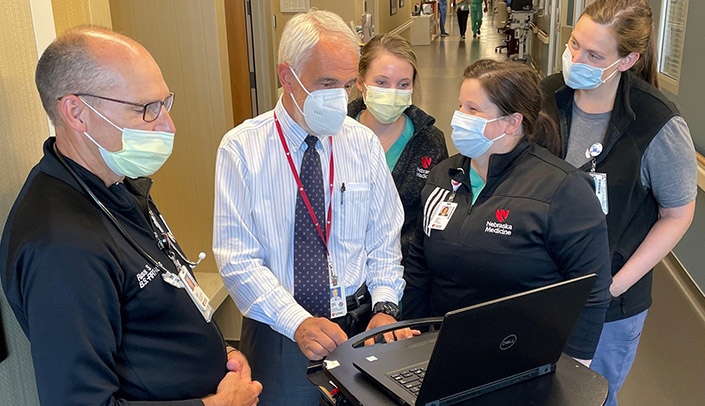Although the early beginnings of neurocritical care date from the poliomyelitis epidemics in 1950 and 1960s, it was not until the 1980s and 1990s that neurologists started to round in intensive care units and 2002 when the Neurocritical Care Society was founded.
At UNMC, it wasn’t until 2014 that Amol Patil, MD, a critical care medicine-trained intensivist with specific interest in critical care neurology, decided the medical center needed to form a separate unit to care for neurocritical care patients. And only a year later, Darryl Gress, MD, a Nebraska native, returned to his home state to undertake the creation of the unit.
Dr. Gress, one of the pioneers in the field of neurocritical care and one of the co-editors for the first textbook on intensive care neurology, already had helped establish several renowned neurocritical care units in the United States. When he returned to Omaha, he helped establish Nebraska's first neuro ICU at UNMC, which to this day remains the only neuro ICU in the state of Nebraska.
"Our goal is to build a state-of-the-art neurocritical care program to provide personalized specialty care to our patients and promote the education of our future caregivers," Dr. Gress said.
Matthew Rizzo, MD, chair of the UNMC Department of Neurological Sciences, said Dr. Gress is a true original.
"It’s everyone’s good fortune that he chose to return home to Nebraska," Dr. Rizzo said. "The institution is better for it in the clinical and academic aspects of the UNMC/Nebraska Medicine missions, as well as reputationally.
"I was just in a meeting with Dr. Walter Koroshetz, director of the NIH National Institutes of Neurological Disorders and Stroke, who worked with Dr. Gress at Harvard. He expressed lasting gratitude for all he learned from Dr. Gress on neurocritical care. Together, Dr. Gress and his colleagues are growing the next generation of much-needed expert clinicians and educators from an expanding pipeline of residents and fellows to tackle the most urgent and difficult brain problems facing our patients."
The UNMC Division of Neurocritical Care includes a neurological intensive care unit that boasts a staff of seven neurointensivists, neurosurgeons, fellow/resident trainees, advanced practice providers, nurses, clinical pharmacists, respiratory therapists, nutritionist and dietitians, physical therapists, speech therapists, occupational therapists, social/case managers and a palliative care team.
"Severely ill neurological patients require caregivers specialized in complex neurological diseases with knowledge and experience in critical care medicine," said Subin Mathew, MD, assistant professor in the division. "Patients often require invasive/noninvasive diagnostic and therapeutic procedures. They need physicians trained to perform close neuromonitoring of the brain rhythms and dynamics who also understand the interaction between the brain physiology and other organ systems.
"Published studies have shown that a dedicated neuro ICU and neuro intensivists save lives and improve outcome in patents with neurological diseases."
Critical care for brain injuries is important for many reasons, Dr. Mathew said.
"Brain injury is associated with several temporal and spatial pathophysiological changes that can start with the primary injury and then lead to secondary brain damages," he said. "Depending on the degree and location of brain injury, it can lead to other organ dysfunction via autonomic nervous system, involvement of the endocrine system, release of inflammatory mediators and even from treatment itself."
The neuro ICU team sees almost 100 cases a month, handling diagnoses such as intracerebral and subarachnoid hemorrhage, neuromuscular respiratory failure, status epilepticus, encephalitis, massive hemispheric infarction, traumatic brain injury and brain infections.
"Neurocritical care is relatively a young field, and there are several new and exciting technologies we have for neuro monitoring and managing cerebral injuries," Dr. Mathew said. "This makes UNMC an exciting place for training young fellows and resident doctors, nurses and medical students."

I cant say enough good things about this unit! Very grateful for it's creation. Dr. Patel is such a caring person. The APPs and nurses have years and years of experience and are second to none!
Thanks nuero ICU team for all you do for our patients!!